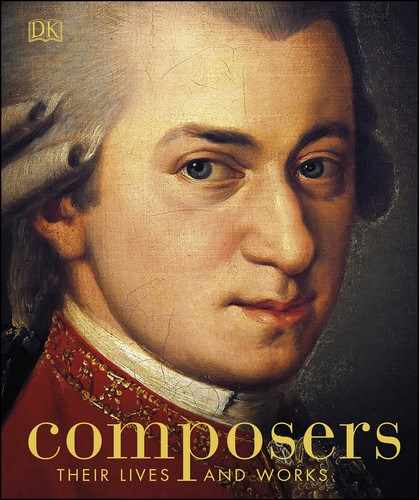Frederick Delius
1862–1934, BRITISH
Although Delius studied music in Germany and lived much of his life abroad, his style was both highly individual and recognizably English, placing him among the greatest British composers of the 20th century.

FREDERICK DELIUS, 1929
This work by Ernest Procter is a sketch of the composer listening to a rehearsal for the Delius festival held at the Queen’s Hall in West London in November 1929. It is a study for a larger painting that shows the composer in his wheelchair.
IN PROFILE
Eric Fenby
Delius’s amanuensis, Eric Fenby (1906–1997), was an organist and choirmaster, and also accompanied silent films on the piano in his local cinema. In 1928, he heard Delius’s music and, learning of the composer’s disabilities, offered his services as an assistant. After Delius’s death, he worked with the music publisher Boosey & Hawkes, and during World War II served in the Royal Army Education Corps. He was appointed artistic director of the 1962 Delius Centenary Festival, and two years later became professor of harmony at the Royal Academy of Music.

ERIC FENBY WITH A GRAMOPHONE ONCE BELONGING TO DELIUS, LONDON, 1980
Fritz Delius (he adopted the name Frederick many years later) was one of 14 children born to Julius and Elise Delius, who had moved to England from Germany. He was born in Bradford—where Julius was a successful wool merchant—and showed an early talent for music. It was, however, assumed that Fritz would follow in his father’s footsteps.
After completing his education in 1880, he worked for the family business in offices in France, Sweden, and Germany. He enjoyed the cultural life of these countries, and also took lessons in music. Still opposed to his son’s wish to take up a musical career, his father then sent him to Florida to manage an orange plantation. Undaunted, Fritz continued his studies in the US, and after a year moved to Danville, Virginia, where he made a living teaching music, French, and German and also composed pieces inspired by US popular songs.
The big break
In 1886, despite his father’s wishes, Fritz moved to Leipzig to study at the Conservatoire. This gave him the grounding in theory he needed, but his inspiration came from meeting Edvard Grieg, who encouraged the young composer and influenced his early style. Grieg persuaded the family to support Fritz’s developing career, and in 1888 he moved to Paris where, with financial help from his uncle, he worked full-time as a composer.
Delius mixed with artists and writers in the city, and it was probably here that he caught syphilis, which plagued his later years; but it was also where he began his relationship with German painter Jelka Rosen. She bought a house in the village of Grez-sur-Loing, just outside Paris, where the couple lived after their marriage in 1903.
Despite his German ancestry and studies in Leipzig, Delius developed a distinctive, eclectic style that owed little to German Romanticism and more to the folk-inspired nostalgia associated with English pastoral music. Surprisingly, however, his music became popular with German conductors and audiences, while comparatively unknown elsewhere. Nonetheless, in 1907, the conductor Thomas Beecham heard some of Delius’s pieces at a concert in London, and became his most ardent champion. Encouraged by Beecham, Delius produced some of his best-known music, including Brigg Fair, the Mass of Life, In a Summer Garden, On Hearing the First Cuckoo in Spring, and A Village Romeo and Juliet.
During World War I, he and Jelka traveled to Norway and Britain, and visited spas in France for Frederick’s health, as the effects of syphilis began to take hold. During the 1920s, as his reputation peaked, he became increasingly incapable of working; by 1928, he was blind and confined to a wheelchair. However, with help from Eric Fenby (see box), he was able to complete and revise his unfinished works, and even start new projects before his death in 1934.

DELIUS AND HIS WIFE, 1929
Delius, in a wheelchair, is shown arriving at Queen’s Hall, London, with his wife, Jelka Rosen, to attend rehearsals of his works conducted by Thomas Beecham.
